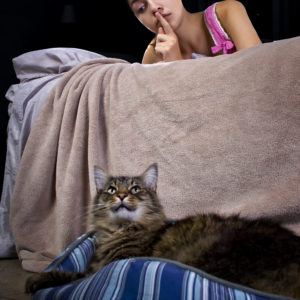Cats are among the best sleepers in the animal kingdom. They sleep about twice as much as humans, and can almost immediately drift off into deep sleep, even after getting revved up by playing. Insomnia is not a cat problem! All in all, there is much to admire about the feline sleeping system, but admiration is probably not what you’re feeling when your cats are running across the bed at 3 o’clock in the morning!

Why is My Cat Up at Night?
The reason it seems as though your cat is nocturnal is because he is crepuscular, an animal naturally more active at dawn and dusk. That transitional time between nightfall and daylight is your cat’s time of greatest activity and when he most wants to hunt, play, eat, and cuddle. It is the time your cat is most likely to seek out your attention.
Because we humans tend to have our deepest sleep at the pre-dawn hours, it can be particularly disruptive to have a cat in your bed who thinks it is time to play. This can be especially intense during spring time, when the daylight length extends and those pre-dawn and dusk times come earlier and later. If you have a younger, active cat, it can seem as though they will never let you sleep!
When your cat keeps you awake in those pre-dawn hours, it is easy to resent seeing him blissfully sleeping later during the day. Cats are fortunate because they can easily cycle from sleep to wakefulness and back again without any of the familiar grogginess that humans experience. Cats are so adept at falling asleep that human sleep researchers used cats as the original models for how REM sleep works. And of course, we all know why the term “catnap” so perfectly describes what those champion feline sleepers do best!
What Can You Do?
Be sure to do everything possible to keep your cat stimulated and busy during the daytime so boredom doesn’t result in oversleeping and then excessive activity during inappropriate times. Active, vigorous play before you get ready to head to bed can help your cat sleep better through the night. This is especially important to do if you have a kitten. It’s imperative not to get up and feed or play with your cat because your cat will learn that pestering you to get out of bed will result in exactly what she wanted! Alternatively, if you try to stay in bed and ignore your cat and then get up only when you’ve reached your personal limit, it will make your cat determined to continue that behavior. The only way to stop this particularly frustrating feline behavior is to never—either accidentally or intentionally—reinforce it.
Contributed by Dr. Cathy Lund, DVM

